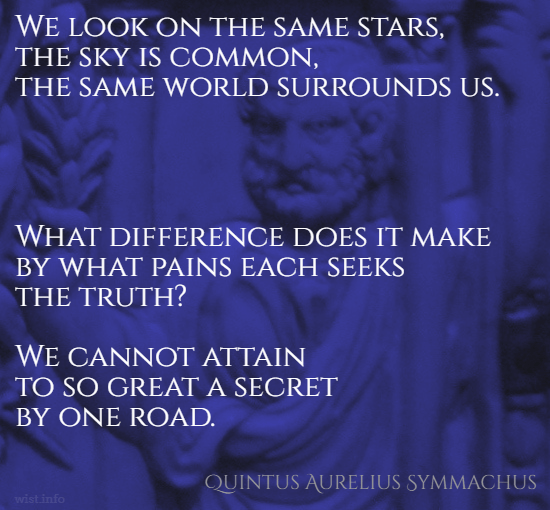You cannot be a slave of two masters; you will hate one and love the other; you will be loyal to one and despise the other. You cannot serve both God and money.
The Bible (The New Testament) (AD 1st - 2nd C) Christian sacred scripture
Luke 16:13 [GNT (1976)]
(Source)
Alternate translations:
No man can serve two masters: for either he will hate the one, and love the other; or else he will hold to the one, and despise the other. Ye cannot serve God and mammon.
[KJV (1611)]
No one can be the slave of two masters: he will either hate the first and love the second, or treat the first with respect and the second with scorn. You cannot be the slave both of God and of money.
[JB (1966)]
No one can be the slave of two masters: he will either hate the first and love the second, or be attached to the first and despise the second. You cannot be the slave both of God and of money.
[NJB (1985)]
No one can serve two masters. Either you will hate the one and love the other, or you will be loyal to the one and have contempt for the other. You cannot serve God and wealth.
[CEB (2011)]
No one can serve two masters, for a slave will either hate the one and love the other or be devoted to the one and despise the other. You cannot serve God and wealth.
[NRSV (2021 ed.)]
Quotations about:
worship
Note not all quotations have been tagged, so Search may find additional quotes on this topic.
“God is love,” as Scripture says, and that means the revelation is in the relationship. “God is love” means God is known devotionally, not dogmatically. “God is love” does not clear up old mysteries; it discloses new mystery. “God is love” is not a truth we can master; it is only one to which we can surrender. Faith is being grasped by the power of love.
William Sloane Coffin, Jr. (1924-2006) American minister, social activist
“Emmanuel,” sermon (1979-12-09)
(Source)
Sermon on Matthew 1:23.
Coffin had used very similar language in an earlier sermon, "Born to Set Thy People Free" (1977-12-04), on John 1:14:
God is known devotionally, not dogmatically. If as Scripture says, "God is love," then the revelation is the relationship. Christianity is not cleaning up old mysteries; it's the disclovsure of a new mystery. It is not a truth that you can master; it's only one to which you can surrender. Faith is being grasped by the power of love.
Wonder is the basis of worship.
Thomas Carlyle (1795-1881) Scottish essayist and historian
Sartor Resartus, Book 1, ch. 10 (1831)
(Source)
If you make money your god, it will plague you like the devil.
(Other Authors and Sources)
English proverb
Sometimes "'twill plague you".
An anonymous proverb, recorded in Thomas Fielding, ed., Select Proverbs of All Nations (1824). Thomas Fielding was the pseudonym of John Wade (1788-1875), a British journalist and author.
Though Fielding was only a compiler of proverbs and aphorisms, the quotation then shows up in a variety of collections later in the 19th Century actually cited to "Fielding," e.g., H. Southgate, ed., Many Thoughts of Many Minds (1862); John Camden Hotten, ed. The Golden Treasury of Thought (1873); Edward Parsons Day, ed., Day's Collacon: an Encyclopaedia of Prose Quotations (1884).
In relatively short order, this "Fielding" then became conflated with the more famous English writer Henry Fielding (1707-1754), to whom this quotation is often credited.
PENTHEUS: Do you hold your rites
during the day or night?
DIONYSUS: Mostly by night.
The darkness is well suited to devotion.
PENTHEUS: Better suited to lechery and seducing women.
DIONYSUS: You can find debauchery by daylight too.[Πενθεύς: τὰ δ᾽ ἱερὰ νύκτωρ ἢ μεθ᾽ ἡμέραν τελεῖς;
Διόνυσος: νύκτωρ τὰ πολλά: σεμνότητ᾽ ἔχει σκότος.
Πενθεύς: τοῦτ᾽ ἐς γυναῖκας δόλιόν ἐστι καὶ σαθρόν.
Διόνυσος: κἀν ἡμέρᾳ τό γ᾽ αἰσχρὸν ἐξεύροι τις ἄν.]Euripides (485?-406? BC) Greek tragic dramatist
Bacchæ [Βάκχαι], l. 485ff (405 BC) [tr. Arrowsmith (1960)]
(Source)
(Source (Greek)). Alternate translations:
PENTHEUS: By night or day these sacred rites perform'st thou ?
BACCHUS: Mostly by nighty for venerable is darkness.
PENTHEUS: To women this is treacherous and unsafe.
BACCHUS: E'en in the broadest day may shame be found.
[tr. Wodhull (1809)]
PENTHEUS: Do you perform the rites by night or by day?
DIONYSUS: Mostly by night; darkness conveys awe.
PENTHEUS: This is treacherous towards women, and unsound.
DIONYSUS: Even during the day someone may devise what is shameful.
[tr. Buckley (1850)]
PENTHEUS: Performest thou these rites by night or day?
DIONYSUS: Most part by night -- night hath more solemn awe.
PENTHEUS: A crafty rotten plot to catch our women.
DIONYSUS: Even in the day bad men can do bad deeds.
[tr. Milman (1865)]
PENTHEUS: Dost thou perform thy rites by day; or night?
DIONYSUS: Chiefly by night; darkness gives dignity.
PENTHEUS: Craft rather and seduction it denotes.
DIONYSUS: Base acts are oft made manifest by day.
[tr. Rogers (1872), l. 462ff]
PENTHEUS: Is it by night or day thou performest these devotions?
DIONYSUS: By night mostly; darkness lends solemnity.
PENTHEUS: Calculated to entrap and corrupt women.
DIONYSUS: Day too for that matter may discover shame.
[tr. Coleridge (1891)]
PENTHEUS: By night or day dost thou perform his rites?
DIONYSUS: Chiefly by night: gloom lends solemnity.
PENTHEUS: Ay -- and for women snares of lewdness too.
DIONYSUS: In the day too may lewdness be devised.
[tr. Way (1898)]
PENTHEUS: How is thy worship held, by night or day?
DIONYSUS: Most oft by night; 'tis a majestic thing,
The darkness.
PENTHEUS: Ha! with women worshipping?
'Tis craft and rottenness!
DIONYSUS: By day no less,
Whoso will seek may find unholiness.
[tr. Murray (1902)]
PENTHEUS: Do you celebrate your sacred acts at night or by day?
DIONYSUS: At night for the most party. Darkness possesses solemnity.
PENTHEUS: Darkness for women is deceitful and corrupt!
DIONYSUS: Even in daytime one could discover disgraceful behavior.
[tr. Kirk (1970)]
PENTHEUS: Do you celebrate your mysteries by night or by day?
DIONYSUS: Chiefly by night. Darkness induces religious awe.
PENTHEUS: For women darkness is treacherous and impure.
DIONYSUS: Impurity can be practiced by daylight too.
[tr. Vellacott (1973)]
PENTHEUS: These sacred practices of your god, the worship,
The rites of great devotion, do they
Hold at night, or in the day.
DIONYSUS: [...] We hold our rites mostly at night
Because it is cooler. And the lamps
Lend atmosphere and feeling to the heart in worship.
[...]
PENTHEUS: And I say night hours are dangerous
Lascivious hours, lechery ....
DIONYSUS: You'll find debauchery in daylight, too.
[tr. Soyinka (1973)]
PENTHEUS: The rites -- at night or by day you perform them?
DIONYSUS: At night, mostly; there’s majesty in darkness.
PENTHEUS: And for women there’s trickery and smut.
DIONYSUS: Even by day one may discover shame.
[tr. Neuburg (1988)]
PENTHEUS: Do you perform your mysteries
during the day or by night?
DIONYSUS: Mostly at night.
The dark is more conducive to worship.
PENTHEUS: You mean to lechery and bringing out the filth in women.
DIONYSUS: Those who look for filth, can find it at the height of noon.
[tr. Cacoyannis (1982)]
PENTHEUS: Do you worship in daylight or at night?
DIONYSUS: Mostly at night. Darkness is most sacred.
PENTHEUS: That is treacherous and unwholesome for women.
DIONYSUS: Some find shame even in daylight.
[tr. Blessington (1993)]
PENTHEUS: Do you celebrate these sacred rites at night or in the day?
THE STRANGER: At night mostly, since darkness induces devotion.
PENTHEUS: No, darkness is devious and corrupts women.
THE STRANGER: Even in the day someone could devise shameful deeds.
[tr. Esposito (1998)]
PENTHEUS: You practice this cult by night or by day?
DIONYSUS: Mostly at night. Darkness lends solemnity.
PENTHEUS: Darkness is just a filthy trap for women.
DIONYSUS: Some people can dig up dirt in daytime, too.
[tr. Woodruff (1999)]
PENTHEUS: Do you perform the rites by day? -- or night?
DIONYSUS: Mostly at night -- because the darkness has its holiness.
PENTHEUS: It's treacherous, for women, and corrupts them.
DIONYSUS: What's shameful can be found even by light of day.
[tr. Gibbons/Segal (2000), l. 571ff]
PENTHEUS: Do you practice your rites at night or by day?
DIONYSUS: Mostly at night: darkness lends solemnity.
PENTHEUS: This is an immoral trick aimed at women.
DIONYSUS: Someone could engage in shameful deeds even by day.
[tr. Kovacs (2002)]
PENTHEUS: And you perform these practices at night?
DIONYSUS: Man's true nature's seen in darkness not in light.
PENTHEUS: While darkness shrouds a woman's true duplicity.
DIONYSUS: Duplicity's not found in night exclusively.
[tr. Teevan (2002)]
PENTHEUS: Tell me, when do you hold your worship? By clear day, or dark night?
DIONYSUS: Mostly by night -- it is a majestic time.
PENTHEUS: Indeed! A majestic time to take advantage of women. Shameful!
DIONYSUS: There are enough shameful things done by day. And enough shameful thoughts in your head, I am sure!
[tr. Rao/Wolf (2004)]
PENTHEUS: These ... holy orgies of yours… do you perform them during the day or in the night?
DIONYSUS: Most of them during the night. Darkness adds a certain modesty.
PENTHEUS: That’s quite a dubious thing for the women… and rather lecherous, I’d say.
DIONYSUS: Shame, of course can be seen during the day, too, if it exists and if one were to look for it.
[tr. Theodoridis (2005)]
PENTHEUS: Do you conduct the mysteries in the night or by day?
DIONYSUS: Us'ally by night, for darkness holds reverence.
PENTHEUS: Is this thing deceitful or unwholesome towards women?
DIONYSUS: One might also uncover shameful things i' the day.
[tr. Valerie (2005)]
PENTHEUS: When you dance these rites,
is it at night or during daylight hours?
DIONYSUS: Mainly at night. Shadows confer solemnity.
PENTHEUS: And deceive the women. It's all corrupt!
DIONYSUS: One can do shameful things in daylight, too.
[tr. Johnston (2008), l. 604ff]
PENTHEUS: These mysteries. Do you practise them by day, or night?
DIONYSUS: Mostly by night. Dark is better for devotion.
PENTHEUS: Better for lechery and the taking of women.
DIONYSUS: That happens in daylight too.
[tr. Robertson (2014)]
PENTHEUS: And are these rites conducted by day or by night?
DIONYSUS: Night, for the most part. It’s so much more ... spiritual. Good for devotion.
PENTHEUS: The night’s a trap for women’s virtue.
DIONYSUS: And the day isn’t? You don’t get out much, do you?
[tr. Pauly (2019)]
PENTHEUS: Do you perform your rituals by day or night?
DIONYSUS: By night. We believe that darkness is holy.
PENTHEUS: It's a cunning time to force filth upon women.
DIONYSUS: Vice thrives in daylight, too.
[tr. Behr/Foster (2019)]
PENTHEUS: Do you perform the sacred rites [hiera] by night or by day?
DIONYSUS: Mostly by night; darkness conveys awe.
PENTHEUS: This is treacherous towards women, and unsound.
DIONYSUS: Even during the day you can find what is shameful.
[tr. Buckley/Sens/Nagy (2020)]
Almost any dog thinks almost any human is the Great Spirit, the Primal Creator, and the Universal Force Behind the Sun and Tides. What human can resist?
The Church of the Interdependency and other religions found their places of worship jammed, as the faithful, the newly faithful and the not-actually-at-all-faithful-but-this-is-some-weird-shit-and-I’m-hedging-my-bets came in and, depending on experience, prayed, meditated or wondered what it was exactly they were supposed to do now that they were there.
Whoever increases the sum of human joy, is a worshipper.
He who adds to the sum of human misery, is a blasphemer.
Robert Green Ingersoll (1833-1899) American lawyer, agnostic, orator
Speech to the Jury, Trial of C. B. Reynolds for Blasphemy, Morristown, New Jersey (May 1887)
(Source)
Like all music, the figured bass should have no other end and aim than the glory of God and the recreation of the soul; where this is not kept in mind there is no true music, but only an infernal clamour and ranting.
[Und soll wie aller Musik also auch des Generalbasses Finis und Endursache anders nicht als nur zu Gottes Ehre und Recreation des Gemütes sein. Wo dieses nicht in acht genommen wird, ists keine eigentliche Musik, sondern ein Teuflisches Geplerr und Geleier.]
All laws for the purpose of making man worship God, are born of the same spirit that kindled the fires of the auto da fe, and lovingly built the dungeons of the Inquisition. All laws defining and punishing blasphemy — making it a crime to give your honest ideas about the Bible, or to laugh at the ignorance of the ancient Jews, or to enjoy yourself on the Sabbath, or to give your opinion of Jehovah, were passed by impudent bigots, and should be at once repealed by honest men.
Robert Green Ingersoll (1833-1899) American lawyer, agnostic, orator
Some Mistakes of Moses, Sec. 3 “The Politicians” (1879)
(Source)
Dogs want only love but cats demand worship.
But when you frequent places of public worship, as I would have you go to all the different ones you meet with, remember that, however erroneous, they are none of them objects of laughter and ridicule. Honest error is to be pitied, not ridiculed. The object of all the public worships in the world is the same; it is that great eternal Being who created everything. The different manners of worship are by no means subjects of ridicule. Each sect thinks its own the best; and I know no infallible judge, in this world, to decide which is the best.
Lord Chesterfield (1694-1773) English statesman, wit [Philip Dormer Stanhope]
Letter to his son, #141 (16 Feb 1748)
(Source)
The worship of God is a Duty; the hearing and reading of Sermons may be useful; but, if Men rest in Hearing and Praying, as too many do, it is as if a Tree should Value itself on being water’d and putting forth Leaves, tho’ it never produc’d any Fruit.
Benjamin Franklin (1706-1790) American statesman, scientist, philosopher, aphorist
Letter to Joseph Huey (6 Jun 1753)
(Source)
It is just that all worship should be considered as one. We look on the same stars, the sky is common, the same world surrounds us. What difference does it make by what pains each seeks the truth? We cannot attain to so great a secret by one road.
[Aequum est quidquid omnes colunt, unum putari. Eadem spectamus astra, commune coelum est, idem nos munus involvit. Quid interest qua quisque prudentia verum requirat? Uno itinere no potest perveniri ad tam grande secretum.]
Quintus Aurelius Symmachus (c. 345-402) Roman statesman, orator, man of letters
“The Memorial of Symmachus, Prefect of the City” [tr. Romestin, Romestin, Duckworth (1896)]
(Source)
Petition on behalf of non-Christian Senators to Emperor Valentinian to restore the Altar of Victory to the Roman Senate.
Alt. trans.: "We gaze up at the same stars; the sky covers us all; the same universe encompasses us. Does it matter what practical system we adopt in our search for the Truth? The heart of so great a mystery cannot be reached by following one road only."
Don’t express your ideas too clearly. Most people think little of what they understand, and venerate what they do not. […] Many praise without being able to say why. They venerate anything hidden or mysterious, and they praise it because they hear it praised.
[No allanarse sobrado en el concepto. Los más no estiman lo que entienden, lo que no perciben lo veneran. […] Alaban muchos lo que, preguntados, no saben dar razón. ¿Por qué? Todo lo recóndito veneran por misterio y lo celebran porque oyen celebrarlo.]
Baltasar Gracián y Morales (1601-1658) Spanish Jesuit priest, writer, philosopher
The Art of Worldly Wisdom [Oráculo Manual y Arte de Prudencia], § 253 (1647) [tr. Maurer (1992)]
(Source)
(Source (Spanish)). Alternate translations:
Not to be too intelligible. Most part do not esteem what they conceive, but admire what they understand not. [...] Many praise that which they can give no reason for, when it is asked them: because they reverence as a mystery all that is hard to be comprehended, and extoll it, by reason they hear it extolled.
[Flesher ed. (1685)]
Do not Explain overmuch. Most men do not esteem what they understand, and venerate what they do not see. [...] Many praise a thing without being able to tell why, if asked. The reason is that they venerate the unknown as a mystery, and praise it because they hear it praised.
[tr. Jacobs (1892)]
A Bit Vague. For most men have low regard for what they understand, and venerate only what is beyond them. [...] Many praise, but if asked can give no reason: Why? for they revere all that is hidden because mysterious, and they sing its praises, because they hear its praises being sung.
[tr. Fischer (1937)]
Those Divine demands which sound to our natural ears most like those of a despot and least like those of a lover, in fact marshal us where we should want to go if we knew what we wanted. He demands our worship, our obedience, our prostration. Do we suppose that they can do Him any good, or fear, like the chorus in Milton, that human irreverence can bring about ‘His glory’s diminution’? A man can no more diminish God’s glory by refusing to worship Him than a lunatic can put out the sun by scribbling the word ‘darkness’ on the walls of his cell. But God wills our good, and our good is to love Him (with that responsive love proper to creatures) and to love Him we must know Him: and if we know Him, we shall in fact fall on our faces. If we do not, that only shows that what we are trying to love is not yet God — though it may be the nearest approximation to God which our thought and fantasy can attain. Yet the call is not only to prostration and awe; it is to a reflection of the Divine life, a creaturely participation in the Divine attributes which is far beyond our present desires. We are bidden to ‘put on Christ’, to become like God. That is, whether we like it or not, God intends to give us what we need, not what we now think we want. Once more, we are embarrassed by the intolerable compliment, by too much love, not too little.
Judaism holds that man can most genuinely worship God by imitating those qualities that are godly: As God is merciful, so must we be compassionate; as God is just, so must we deal justly with our neighbor; as God is slow to anger, so must we be tolerant.
Idolatry is worse than atheism.
Abdal Hakim Murad (b. 1960) British Muslim shaykh, researcher, writer, academic [b. Timothy John Winter]
“Contentions 2,” #37
(Source)
Apart from moral conduct, all that man thinks himself able to do in order to become acceptable to God is mere superstition and religious folly. If once a man has come to the idea of a service which is not purely moral, but is supposed to be agreeable to God himself, or capable of propitiating him, there is little difference between the several ways of serving him. For all these ways are of equal value. … Whether the devotee accomplishes his statutory walk to the church, or whether he undertakes a pilgrimage to the sanctuaries of Loretto and Palestine, whether he repeats his prayer-formulas with his lips, or like the Tibetan, uses a prayer-wheel … is quite indifferent. As the illusion of thinking that a man can justify himself before God in any way by acts of worship is religious superstition, so the illusion that he can obtain this justification by the so-called intercourse with God is religious mysticism. Such superstition leads inevitably to sacerdotalism which will always be found where the essence is sought not in principles of morality, but in statutory commandments, rules of faith and observances
The God of Hell should be held in loathing, contempt and scorn. A God who threatens eternal pain should be hated, not loved — cursed, not worshiped. A heaven presided over by such a God must be below the lowest hell. I want no part in any heaven in which the saved, the ransomed and redeemed will drown with shouts of joy the cries and sobs of hell — in which happiness will forget misery, where the tears of the lost only increase laughter and double bliss.
Robert Green Ingersoll (1833-1899) American lawyer, agnostic, orator
“The Great Infidels” (1881)
(Source)
When religion becomes organzied, man ceases to be free. It is not God that is worshiped but the group or the authority that claims to speak in his name. Sin becomes disobedience to authority and not violation of integrity.
Sarvepalli Radhakrishnan (1888-1975) Indian philosopher, statesman
East and West: Some Reflections, Preface (1955)
(Source)
Variants:
- "It is not God that is worshiped but the authority that claims to speak in His name."
- An expanded version in Religion, Science and Culture, ch. 3 "The World Communities of Ideals" (1965) includes an inserted second sentence: "If we think that it is a question of life or death -- what concept of God we accept -- then our hearts are filled with fury."
You can take away a man’s gods, but only to give him others in return.
Reason, Observation and Experience — the Holy Trinity of Science — have taught us that happiness is the only good; that the time to be happy is now, and the way to be happy is to make others so. This is enough for us. In this belief we are content to live and die. If by any possibility the existence of a power superior to, and independent of, nature shall be demonstrated, there will then be time enough to kneel. Until then, let us stand erect.
Chi-lu asked how the spirits of the dead and the gods should be served. The Master said, “You are not able even to serve man. How can you serve the spirits?”
[季路問事鬼神。子曰、未能事人、焉能事鬼。]
Confucius (c. 551- c. 479 BC) Chinese philosopher, sage, politician [孔夫子 (Kǒng Fūzǐ, K'ung Fu-tzu, K'ung Fu Tse), 孔子 (Kǒngzǐ, Chungni), 孔丘 (Kǒng Qiū, K'ung Ch'iu)]
The Analects [論語, 论语, Lúnyǔ], Book 11, verse 12 (11.12) (6th C. BC – AD 3rd C.) [tr. Lau (1979)]
(Source)
Brooks (below) suggests that this passage was interpolated into Book 11 around the time of Book 16. This analect was originally numbered 11.11 by Legge and other early translators (as noted below). (Source (Chinese)). Alternate translations:
Chi Lu asked about serving the spirits of the dead. The Master said, "While you are not able to serve men, how can you serve their spirits?"
[tr. Legge (1861), 11.11]
Tszlu propounded a question about ministering to the spirits ((of the departed). The Master replied, "Where there is scarcely the ability to minister to living men, how shall there be ability to minister to the spirits?"
[tr. Jennings (1895), 11.11]
A disciple (the intrepid Chung Yu) enquired how one should behave towards the spirits of dead men. Confucius answered, "We cannot as yet do our duties to living men; why should we enquire about our duties to dead men?"
[tr. Ku Hung-Ming (1898), 11.11]
When Chi Lu asked about his duty to the spirits the Master replied: "While still unable to do your duty to the living, how can you do your duty to the dead?"
[tr. Soothill (1910), 11.11]
Chi Lu asked about the service for ghosts and spirits. Confucius said, You cannot be useful to the living, how can you be useful to (serve) ghosts?
[tr. Pound (1933), 11.11]
Tsu-lu asked how one should serve ghosts and spirits. The master said, Till you have learnt to serve men, how can you serve ghosts?
[tr. Waley (1938), 11.11]
You can’t treat spirits and divinities properly before you are able to treat your fellow men properly.
[tr. Ware (1950)]
Zilu asked about serving ghosts and spirits. The Master said: "If one is not yet capable of serving men, how can one serve ghosts?"
[tr. Dawson (1993)]
Zilu asked how to serve the spirits and gods. The Master said: "You are not yet able to serve men, how could you serve the spirits?"
[tr. Leys (1997)]
When Ji-lu asked how to serve the spirits and gods, the Master said, "You cannot serve men yet; how can you serve the spirits?"
[tr. Huang (1997)]
Jilu asked how to service the gods, Confucius said: "One could not service the human beings yet, how could one service the gods?"
[tr. Cai/Yu (1998), #272]
Zilu asked how to serve the spirits and the gods. The master replied, "Not yet being able to serve other people, how would you be able to serve the spirits?"
[tr. Ames/Rosemont (1998)]
Jì-Lì asked about serving ghosts and spirits. The Master said, You cannot yet serve men, how could you serve ghosts?
[tr. Brooks/Brooks (1998)]
When Adept Lu asked about serving ghosts and spirits, the Master said, "You haven't learned to serve the living, so how could you serve ghosts?"
[tr. Hinton (1998)]
Zilu asked about serving ghosts and spirits. The Master said, “You are not yet able to serve people -- how could you be able to serve ghosts and spirits?”
[tr. Slingerland (2003)]
Jilu asked how one should serve the gods and spirits. The Master said, "When you don't yet know how to serve human beings, how can you serve the spirits?"
[tr. Watson (2007)]
Jilu [Zilu] asked about how to serve the spirits of the dead and the gods. The Master said, "You can't even serve men properly, how can you serve the spirits?"
[tr. Annping Chin (2014)]
Ji Lu asked about how to serve and worship gods and spirits. Confucius said, "You still have not served men well. Why do you bother serving gods and spirits?"
[tr. Li (2020)]
If you don't know how to serve men, why worry about serving the gods?
[Common translation]























